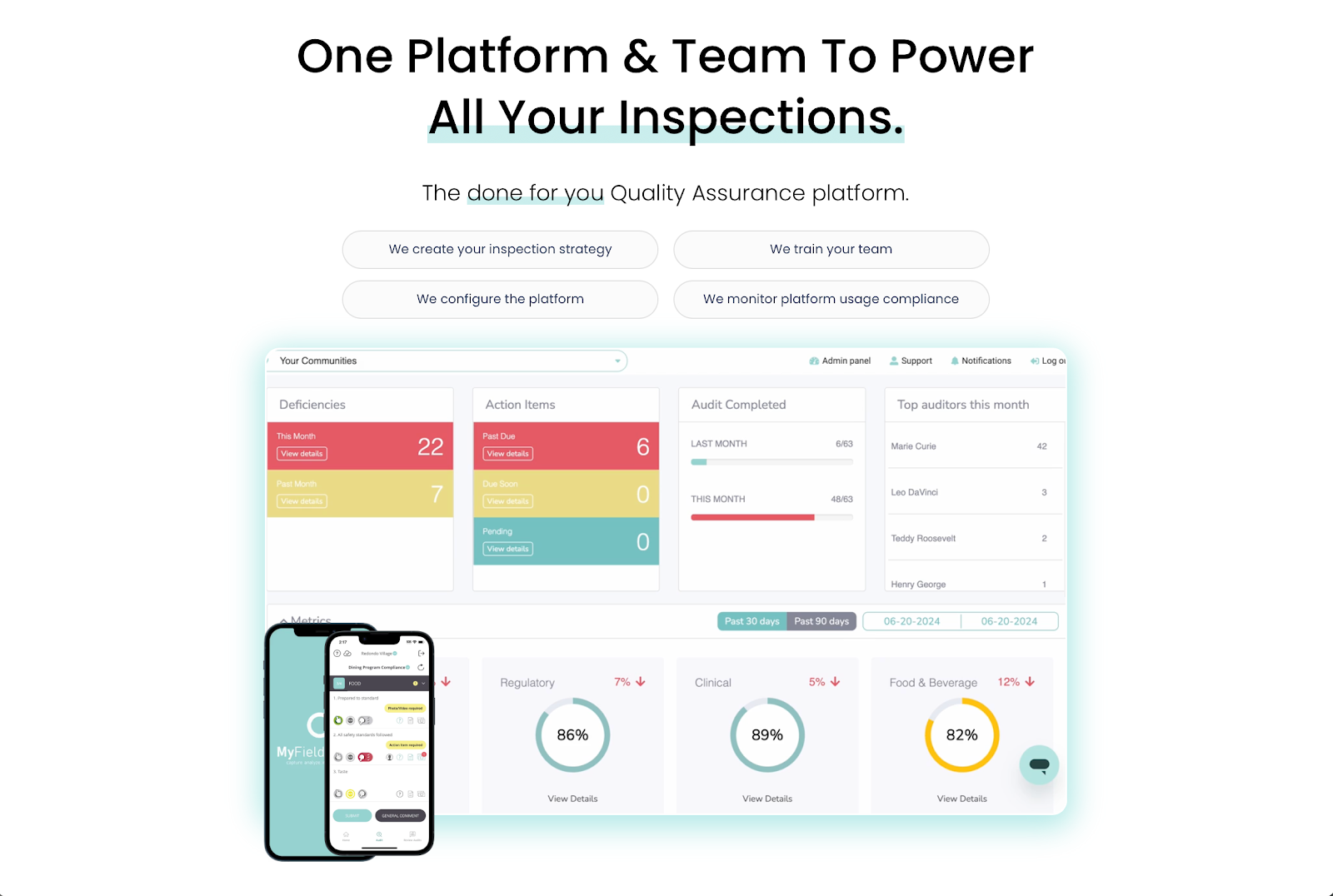.svg)
Best Food Safety Certification Programs and Standards

Take Control of QA.
Make Inspections Effortless.

We’ll quickly uncover your needs and share how we can help—no pressure, no stress, just solutions. Grab your spot on our calendar today!
Be survey-ready every day with three simple dining audits

We’ll quickly uncover your needs and share how we can help—no pressure, no stress, just solutions. Grab your spot on our calendar today!
Whether you manage a restaurant or operate a food manufacturing business, getting certified helps maintain food safety compliance, protect your customers, and improve client retention.
However, with so many certification programs and safety standards out there, choosing the right one can be confusing. Some are required by law, while others are based on your industry or customer demands.
In this guide, we will discuss the best food safety certification programs and standards to follow. We'll also help you decide which one fits your operations and helps you stay compliant.
TL;DR
- The best food safety certification programs and standards are the USDA Organic Certification, FSMA, GMP, HACCP, ISO 22000, GFSI, and the NRFSP Food Safety Manager Certification.
- Food safety certification proves that a food business follows recognized standards and best practices to ensure food safety.
- Getting certified improves stakeholder trust, enhances reputation, reduces the risk of foodborne illness, and expands market access.
- MyFieldAudits helps food businesses obtain certifications by managing the entire lifecycle of on-site inspections and tracking compliance with food safety requirements.
What Is Food Safety Certification?
A food safety certification is a formal document that proves you follow recognized safe food-handling practices.
It shows that your food production processes meet certification requirements set by local, national, or global food safety organizations. These standards cover how you handle, store, prepare, and serve food across multi-site operations.
To get certified, you need to pass a safety audit from an approved certification body. For example, if you operate in the United States, you should comply with the Food Safety Modernization Act (FSMA) enforced by the Food and Drug Administration (FDA).
Food certifications apply to all types of food-related businesses, from farms and beverage manufacturers to restaurants and even assisted living facilities.
Different Levels of Food Safety Compliance and Certifications
To obtain certification, your food business should meet different levels of food safety requirements. These levels build on each other and depend on your operation, size, and market.
- Local food safety laws: These refer to state-specific and local regulations that cover basic personal hygiene, food handling, and inspection requirements. You should follow these laws to obtain a license and operate legally in the food industry.
- Good manufacturing practices (GMP): GMP certification lays the foundation for safe food production. It focuses on cleanliness, controlled processes, and proper documentation in the food supply chain.
- Hazard analysis and critical control points (HACCP): HACCP audits identify where food safety hazards could occur and put controls in place to stop them.
- ISO certifications: These prove your food business meets globally recognized food safety regulations. Many global buyers and partners expect ISO certifications.
- GFSI-recognized certifications: These meet global standards set by the Global Food Safety Initiative (GFSI). They include British Retail Consortium (BRC) Standards, Safe Quality Food (SQF), FSSC 22000, and other globally recognized certification programs.
Best Food Safety Certifications and Standards
After understanding the different levels of food standards, it's time to discuss the best food safety certifications.
USDA Organic Certification
The USDA Organic Certification is designed for food handlers who aim to market their products as organic within the United States.
This certification applies to different operations, including farms, ranches, and processing facilities that produce food, feed, or fiber products.
To get certified, you should adopt organic practices, work with a USDA-accredited certifying agent, and submit a complete application.
During the food handler certification process, the certifying body will review your application while an inspector conducts a field inspection. The certification agency also evaluates the inspector’s report to determine if you comply with the USDA organic regulations.
Having USDA Organic Certification enhances your product's credibility and supports local economies. Other benefits include access to growing organic markets and funding assistance.
Food Safety Modernization Act
The Food Safety Modernization Act is a federal law that changes how businesses handle foodborne illnesses. Rather than managing food safety risks reactively, this regulation emphasizes prevention over reaction. The U.S. Food and Drug Administration enforces the act.
The law covers both domestic and foreign facilities that manufacture, process, pack, or hold food for U.S. consumption. It also extends to farms, transporters, and importers.
FSMA Rules
Follow these guidelines to comply with the FSMA:
- Produce safety: Meet science-based standards for the safe growing, harvesting, packing, and holding of fruits and vegetables to reduce contamination risks.
- Pre-harvest agricultural water: Manage risks associated with water used during growing activities to prevent contamination. It mainly covers small and large farms.
- Accredited third-party certification: It outlines the requirements that accredited third-party auditors should follow. Certification allows them to conduct food safety management audits and certify that foreign food facilities comply with U.S. federal law.
- Food traceability: Maintain complete records that include Key Data Elements (KDEs) associated with specific Critical Tracking Events (CTEs). The goal is to quickly identify and trace the movement of food products in case of contamination events.
- Foreign supplier verification: If you import food, verify that foreign suppliers meet U.S. food safety management practices.
- Laboratory accreditation: This rule establishes a program for the accreditation of laboratories that conduct comprehensive food safety testing.
- Intentional adulteration measures: Implement strategies to protect against acts intended to cause large-scale public harm, such as food terrorism.
- Preventive controls: Meet the requirements for risk-based preventive controls to ensure safe food for humans and animals.
- Sanitary transportation practices: Shippers, carriers, and receivers should verify that transportation equipment and operations can handle food safely. This prevents contamination during transit.
Good Manufacturing Practices
Good manufacturing practices (GMP) are food safety management systems enforced by the FDA under the Federal Food, Drug, and Cosmetic Act.
It requires food manufacturers, processors, and packagers of medical drugs to follow established quality standards. These GMP standards make sure food products are consistently and safely produced to prevent contamination, mix-ups, and errors.
GMP also lays the foundation for record keeping, staff qualifications, workplace health and safety, equipment verification, process validation, and complaint handling.
However, most good manufacturing practices are left for interpretation. These give you the flexibility to decide how to best implement the necessary quality controls at your own pace.
Hazard Analysis and Critical Control Points
HACCP uses a proactive method to find, assess, and manage potential hazards at every stage of food production.
This food safety management system is designed to prevent biological, chemical, and physical food hazards before they occur.
HACCP certification is only mandatory for food manufacturers like juice producers, seafood merchants, and meat and poultry processors.
That said, HACCP is highly recommended as a best practice for any food safety plan. It can be applied voluntarily to the restaurant industry and other food service management companies (e.g., cafes, hotels, and corporate dining services).
HACCP Principles
If you want to implement HACCP in your current food processes, apply the following key principles:
- Conduct a hazard analysis
- Determine critical control points
- Establish critical limits
- Develop monitoring procedures
- Establish corrective actions
- Follow verification procedures
- Establish record-keeping and documentation procedures
ISO 22000
ISO 22000 is an international standard benchmarked by the International Organization for Standardization. It ensures food quality by identifying and controlling food safety hazards.
ISO 22000 covers all types of organizations within the food chain, regardless of business size or position. These include primary producers, food manufacturers, processors, retailers, and even food-related companies like equipment manufacturers and cleaning service providers.
To achieve ISO 22000 certification, you should combine HACCP principles and ISO 9001 (quality management) standards.
It's also important to establish a food safety management system that outlines the processes and procedures to manage biological, chemical, and physical hazards. Then, you should implement prerequisite programs and traceability systems.
Maintaining effective communication with stakeholders is also a key component of ISO 22000 certification.
Global Food Safety Initiatives
GFSI is a collaborative effort managed by the Consumer Goods Forum that unites major retailers, manufacturers, and other stakeholders to enhance food safety management systems worldwide.
The Global Food Safety Initiative does not provide food safety certifications itself. However, it recognizes various food safety courses and certification programs that meet its strict benchmarking requirements.
Here are the key certification programs that have earned GFSI recognition:
Brand Reputation Through Compliance Global Standard (BRCGS)
BRCGS, previously known as the British Retail Consortium Standards, is a popular food safety certification standard used in more than 130 countries.
BRCGS focuses on food safety, product quality, and legal compliance. It also covers requirements for allergen management, product testing, supplier monitoring, and traceability.
If you seek BRCGS certification, you should implement detailed food safety management systems, risk assessments, temperature control, and hygiene practices. You must also pass surveillance audits to verify ongoing compliance.
Safe Quality Food Institute
The SQF program is a globally recognized certification managed by the Safe Quality Food Institute. It applies to all parts of the food supply chain, from primary production to manufacturing and distribution.
The program offers multiple certification levels depending on the complexity of the operation, including food safety only or a combination of food safety and quality.
To obtain SQF certification, you should develop and maintain a written food safety training plan based on HACCP principles. Next, implement strict traceability and sanitation procedures. Lastly, receive a passing score from a certification audit.
Food Safety System Certification 22000
FSSC 22000 is a GFSI-recognized certification scheme based on ISO 22000 standards with additional sector-specific requirements and prerequisite programs (PRPs).
It targets food manufacturers, animal feed producers, food packaging companies, and storage and transport services.
FSSC 22000 certification is useful if you're already familiar with ISO-based systems or if you export to global markets.
To obtain this certification, you should implement a food safety management system that addresses hazard control, operational prerequisites, traceability, and emergency preparedness.
You should also pass third-party audits, which can evaluate your company's compliance with ISO 22000 and FSSC’s additional criteria.
International Featured Standards
IFS is a globally recognized program focused on food safety and quality standards. It applies to all companies in the food and consumer goods supply chain. It also covers food manufacturers that supply private-label products.
IFS emphasizes internal audits, customer focus, and continuous improvement. It requires you to meet strict standards for product specifications, supplier approval, allergen control, and crisis management.
IFS provides a detailed scoring system that highlights performance in specific areas. It evaluates food safety professionals based on how well they meet requirements and whether there are any major or minor non-conformities.
Here is a breakdown of the IFS scoring system:
- A: This score represents full regulatory compliance.
- B: It means some areas need improvement.
- C: This is given to businesses with major deviations.
- D: It signifies that an organization did not meet compliance requirements.
- K/O: It indicates a non-implementation of requirements, which leads to automatic non-certification.
NRFSP Food Safety Manager Certification
The National Registry of Food Safety Professionals (NRFSP) Food Manager Certification is a credential accredited by the American National Standards Institute (ANSI).
It applies to managers responsible for overseeing food safety in restaurants, hospitality venues, and other food service operations.
This certification makes sure that your manager has the knowledge and skills needed to identify foodborne hazards, implement effective food safety practices, and comply with FDA Food Code guidelines.
It is recognized nationwide and meets most local and state regulatory requirements for certified food protection managers.
However, the certificate is only valid for a specified period, typically up to five years. Foodservice professionals can take the multiple-choice exam at home or in person at a testing center to get recertified. Undergoing a practice test is recommended to pass.

The Importance of Food Safety Certifications
Undergoing the food safety certification process is important for several reasons. Here's why:
Build Trust With Customers, Suppliers, and Retailers
Food safety certifications help you build confidence across every part of your supply chain. When your business is certified, you’re showing that you follow established food safety protocols and meet strict industry requirements.
Customers are more likely to trust your products, knowing you’ve passed third-party audits and strict requirements. This consumer trust can improve loyalty and retention.
Retailers and suppliers also prefer working with you because certification can reduce their food safety risks. In many cases, large buyers won’t even consider a partnership unless you are certified.
Certification also strengthens your internal operations. It indicates that your team is properly trained to handle hazards, your systems are controlled, and your products are consistently safe.
Boost Brand Reputation
In addition to building trust, safety certifications can boost your company's reputation in the food industry. They prove that you are committed to safety, consistency, and professionalism.
Third-party certificates also show that you’ve taken steps to prevent food safety risks. They help you avoid food recalls, cross-contamination issues, and quality problems, which can harm public health and damage your brand image.
Certifications give you a competitive advantage in the food processing industry. They separate you from organizations that only meet the bare minimum. This leads to more customers and repeat business.
Reduce the Risk of Foodborne Illnesses and Recalls
One of the biggest threats to any food business is the risk of contamination. A single mistake linked to your product can lead to foodborne illnesses, product recalls, lawsuits, and long-term damage to your reputation.
Food safety certificates help you avoid that. They require you to identify areas of improvement, control your processes, and regularly test your systems to maintain certification. That means issues get caught before they reach customers.
Certification also means you're following traceability protocols, so if something goes wrong, you can act fast.
Instead of guessing where a problem started, you’ll have the data to respond quickly and reduce harm. This helps avoid large-scale recalls, protects your customers, and saves your business from costly damage.
Expand Market Access
Many retailers, distributors, and international buyers require proof that your business meets recognized food safety standards. Without certifications, you might be limited to local markets or smaller contracts.
On the flip side, being certified means you can supply to national chains, export your products, or work with institutional clients like hospitals and schools.
Passing certification courses can open doors for your food service company. You can easily expand into new regions or industries and reach more customers.
How Does MyFieldAudits Help You Run Better Operations?
MyFieldAudits offers a mobile-friendly platform that gives you real-time visibility into what's happening on the ground.
With MyFieldAudits, you can schedule inspections, assign corrective actions, and share reports with clients. You can instantly show proof of performance and compliance, which can build client trust and retention.
However, MyFieldAudits is more than just a quality management system. They are a committed partner for any business working toward food and beverage certifications.

The experts behind MyFieldAudits will work with your organization to build a structured Quality Assurance program that meets the legal requirements and standards set by certifying bodies.
They can also provide training and monitor compliance for your business. This helps you stay audit-ready while supporting long-term food safety success across all your locations.
Book a personalized demo today or watch this video to learn more about MyFieldAudits.
Meet Food Safety Standards With MyFieldAudits
MyFieldAudits can help you meet food safety standards and get certified by managing the entire lifecycle of on-site inspections.
With a mobile-friendly platform that includes fully customizable forms and real-time reports, you can comply with standards like FSMA, HACCP, ISO 22000, and more.
However, MyFieldAudits is not just another do-it-yourself software provider. They are a hands-on partner that can train your site team, configure the platform, and track compliance. This allows you to focus on meeting strict standards and obtaining certification.
Schedule a discovery call right now to keep food safety compliance consistent through turnover! You can also dial (844) 344-7265 to contact MyFieldAudits.
FAQs About Best Food Safety Certification
Which food safety certification is best?
There isn’t one “best” option for everyone. It entirely depends on your food business goals and requirements.
For example, ISO 22000 is useful for global operations. Major retailers prefer GFSI-recognized programs, like SQF, BRCGS, or FSSC 22000. For supervisors, consider obtaining the Certified Food Protection Manager (CFPM) certification and signing up for food safety training courses.
Which certification is best for the food industry?
The best certification varies based on your business type and specific operational needs. HACCP suits manufacturers and restaurants focusing on hazard prevention, while ISO 22000 works well for companies needing global recognition. SQF and BRCGS are preferred by retailers and large suppliers, and the USDA Organic Certification suits farms and processors.
Is getting ServSafe certified worth it?
Yes, ServSafe is worth getting. This certification is trusted across the U.S. foodservice industry. It equips staff with the necessary knowledge for safe food handling and foodborne illness prevention. It also includes specific online training programs for alcohol servers to ensure compliance in restaurants and bars.
In addition to ServSafe, other online course materials, such as those recognized by the international HACCP alliance, also improve your approach to food safety.
What is the best safety certification to get?
Leading food safety certifications include HACCP, ISO 22000, SQF, BRCGS, FSSC 22000, and USDA Organic. These are widely recognized by regulators, consumers, and suppliers.
%201.svg)






%201%20(1).svg)